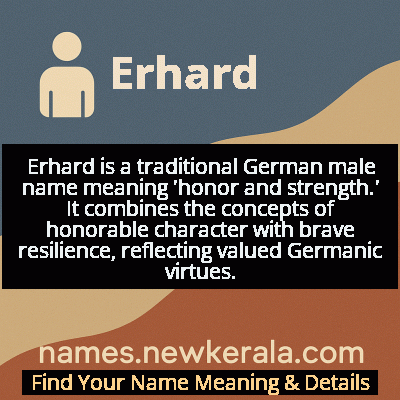Erhard Name Meaning & Details
Origin, Popularity, Numerology Analysis & Name Meaning of Erhard
Discover the origin, meaning, and cultural significance of the name ERHARD. Delve into its historical roots and explore the lasting impact it has had on communities and traditions.
Name
Erhard
Gender
Male
Origin
German
Lucky Number
9
Meaning of the Name - Erhard
Erhard is a traditional German male name meaning 'honor and strength.' It combines the concepts of honorable character with brave resilience, reflecting valued Germanic virtues.
Erhard - Complete Numerology Analysis
Your Numerology Number
Based on Pythagorean Numerology System
Ruling Planet
Mars
Positive Nature
Generous, passionate, energetic, and humanitarian.
Negative Traits
Impulsive, impatient, moody, and can be overly emotional.
Lucky Colours
Red, maroon, scarlet.
Lucky Days
Tuesday.
Lucky Stones
Red coral, garnet.
Harmony Numbers
1, 2, 3, 6.
Best Suited Professions
Military, sports, philanthropy, leadership roles.
What People Like About You
Courage, energy, leadership, generosity.
Famous People Named Erhard
Erhard Milch
Military Officer
Luftwaffe Field Marshal and head of aircraft production during WWII
Ludwig Erhard
Politician/Economist
Chancellor of West Germany and father of Germany's post-war economic miracle
Erhard Heiden
Military Officer
Third Reichsführer-SS of the SS from 1927 to 1929
Erhard Altdorfer
Artist
German Renaissance painter and printmaker
Name Variations & International Equivalents
Click on blue names to explore their detailed meanings. Gray names with will be available soon.
Cultural & Historical Significance
The name gained prominence during the Holy Roman Empire period and maintained its status through various German states and principalities. In the 20th century, the name became associated with political leadership through figures like Ludwig Erhard, who helped shape modern Germany's economic identity. Despite its historical significance, the name has remained relatively uncommon, preserving its distinctive character and connection to traditional German values.
Throughout German history, the name Erhard has symbolized the ideal of combining strength with moral integrity, representing a cultural preference for leaders who are both capable and principled. This reflects broader Germanic cultural values that emphasize reliability, honor, and steadfastness in both personal character and public leadership.
Extended Personality Analysis
Individuals named Erhard are typically perceived as strong-willed, principled, and reliable. They often exhibit leadership qualities combined with a deep sense of honor and responsibility. Their strength of character is usually matched by practical intelligence and determination, making them natural problem-solvers who approach challenges with methodical precision.
Erhards tend to be traditional in their values yet innovative in their thinking, balancing respect for established principles with forward-looking perspectives. They often command respect through their consistency and integrity rather than through charisma alone. While they may appear reserved initially, they form deep, loyal relationships and are known for their steadfast support of those they care about.
Their combination of strength and honor makes them particularly effective in positions requiring both moral authority and practical competence. Erhards are often seen as pillars of stability in their communities or workplaces, providing reliable guidance during times of uncertainty. They typically prefer substance over style and are valued for their unwavering commitment to their principles and responsibilities.
Modern Usage & Popularity
In contemporary times, Erhard is considered a classic but relatively rare German name. It experienced peak popularity in the early to mid-20th century but has declined significantly since the 1970s. Today, it is primarily used by families with strong German heritage or those seeking traditional, meaningful names with historical depth. The name maintains a certain distinguished quality and is occasionally chosen by parents looking for strong, traditional names that stand out from more common modern choices. Its usage remains concentrated in German-speaking countries, particularly among older generations, though it occasionally appears as a middle name or in families with particular appreciation for German cultural history.
Symbolic & Spiritual Meanings
Symbolically, Erhard represents the ideal of honorable strength and moral courage. The name embodies the concept of strength tempered by integrity, suggesting someone who wields power responsibly and maintains principles under pressure. It symbolizes the Germanic ideal of the 'strong protector' - someone who combines physical or mental strength with unwavering ethical standards.
Metaphorically, Erhard suggests a foundation of reliability and steadfastness, much like the ancient Germanic warriors who inspired the name. It represents the balance between force and honor, suggesting that true strength lies not just in capability but in how that capability is applied. The name carries connotations of durability, resilience, and moral fortitude, making it symbolic of enduring values in changing times and representing the ideal of leadership that serves rather than dominates.

